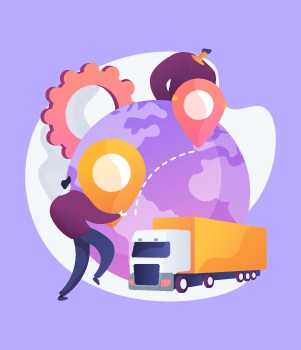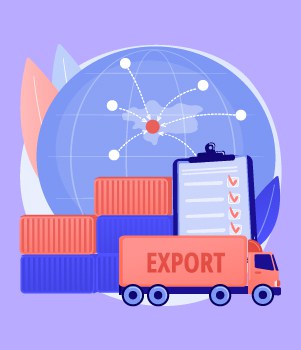Introduction

Building a business can get complicated pretty fast. There are many logistics that you, as the boss, need to work out. If you’re doing business overseas, however, you can expect even more logistics to fall on your desk. In an increasingly globalized world, expanding your business overseas is often the next logical step when growing your company.
You need to be prepared when taking this leap. When you’re new to overseas business management, you’re going to need a guide. Fortunately, that’s what you’re reading right now.
If you’re unsure of any or all of the following information, you’ll benefit from reading what this guide has to offer:
- The Advantages of Overseas Business
- The Disadvantages of Overseas Business
- Practical Advice on Getting Started
- How to Craft a Business Expansion Strategy
- Common Mistakes to Avoid
- Helpful Tools to Use
Along with several helpful online tools you can consult to make your overseas dealings a success, we’ve also included links to external materials. These have been used to provide background reading on certain topics and include relevant statistics to overseas business practices.
Let’s start with the benefits of taking your business operation overseas.
Advantages of Doing Overseas Business

You can only expect a limited amount of growth when you run a business within the confines of your own country’s borders. Your specific reasons for desiring an overseas expansion may differ but there are a lot of advantages to making the move. Check out five of the most prominent examples below.
Explore New Markets
Needless to say, taking your business overseas exposes your business to new and exciting market opportunities. That’s kind of the point of it, actually. Why this is an important benefit is because, as we said, you can only grow so much on a local or national level before you peak.
Every business will hit a plateau eventually. How fast you’ll hit it will depend on how competitive your home market is and when you do, you don’t want to try and force growth as you may invest more and more into the venture only to have diminishing returns when the business year is done.

If your business ventures seem to have hit a plateau or have even been flagging for the last few business years, it might be time to expand into the global market. By accessing adjacent and overseas markets, you get new customers who bring with them new revenue yields, all while increasing your brand awareness worldwide.
If you offer a wider variety of products and/or services, you will also be able to extend their sales life by finding these new markets that are receptive to new ideas. Even better, sometimes these new markets won’t even have a provider for the products or services you offer, in which case you can usually expect a great amount of demand and the jumpstart that your business needs.
Reduce Dependency on the Market You Are Already Established In

By building your business in one market and one market alone, you’ve shackled yourself to that market’s successes and failures. You’re dependent on that market and, like with any investment, it’s best to be diversified so that you don’t get wiped out by a single market disruption.
After 2020, we’ve seen all too well how localized markets can get disrupted by health emergencies that are totally out of the control of the world’s most powerful governments. Along with encouraging businesses to make the transition online, lockdowns and other restrictive practices have also highlighted the need to operate in multiple markets.
If your local market is extremely competitive and your business is suffering from it, then you should think about expanding to other markets. This guide is on overseas markets, of course, so you should look at other countries where your business can perform well. If an overseas destination isn’t readily available or affordable, expanding to adjacent local markets as a local business is better than stagnancy.
Ability to Learn New Tips, Tricks, and Techniques
Starting and building your own business is a learning experience. After finding success in your home markets, the chances are that you’re versed in all of the tricks and techniques that apply to your business, your industry, your sector, and your country.
You don’t know these aspects of other markets, however, and that’s where the learning comes in. If you’re an entrepreneur who wants to expand their business skillset beyond your current level, taking your business international can be the perfect way to expand your business knowledge.

With a new market comes new localized technologies, a raft of new experts native to that market, and other common business practices that might not exist back home. You don’t just get the benefits of expanding into this new market, you also acquire new knowledge that you can take home and use to improve your local business. That way, you can jumpstart the home branch of your business too if it’s reached a point of stagnation.
Work With Talented People and Experts

An important and distinct part of the new techniques you learn in overseas markets is the people who will teach them to you. Even today, where so many businesses exist digitally and one person can coordinate international business through their smartphone, manpower is still important when building a business.
Your overseas business will be able to recruit, contract, and collaborate with talented individuals and distant industry experts who can offer insight into the markets and demographics you’re targeting.
The mileage you get out of overseas experts will depend on how compatible that market is with your business. For example, if your industry also exists at an overseas location then you’re going to get a lot of help from these talented people who can help you settle in and claim your place in exciting new economies.
If a business like yours is the first of its kind at that location, you won’t get as much help. You do get a first mover’s advantage, however, and can expect to have a lot of demand for whatever it is that you’re selling as long as you can market it to this new crowd.
Get Ahead of Your Competitors
If you hadn’t figured it out from the above benefits, many of them can be used to give you an edge that allows you to compete with competitors. If the market back home is very competitive, gaining an overseas business venture is perfect for getting an advantage over other businesses in your industry.
By having an overseas extension, you become a larger business and earn more revenue to spend on the continued development of your company. That puts you ahead of the competition, sometimes in a big way that means the continued survival of your business. Remember the first-mover advantage mentioned above. If you’re the first local business in your industry to expand overseas, you’re in a pretty good position.

Even if some of your usual competitors already have overseas expansions and you’re just playing catch up, you can target different territories and find the same successes despite your competitors.
Disadvantages of Doing Overseas Business

Taking your company to international levels comes with a lot of advantages, as covered above, but there’s always going to be disadvantages too. Like any competent businessperson, you need to weigh up the costs against the benefits and be prepared for the eventuality that something goes wrong during expansion. A successful expansion keeps the possible disadvantages in mind, and at bay, while also reaping the advantages.
With that in mind, be prepared to face these common disadvantages when you take your business overseas. You can find further reading on some of these issues here.
Cultural Barriers
Perhaps the more obvious barrier to overseas expansion, you’ll need to remember that the world is home to many different cultures different from your own. This means you can expect subtle and drastic differences with the following:
- The language spoken can be different from your homeland.
- Differences in interpersonal communication habits and physical gestures can cause embarrassment.
- Public communication etiquette can harm your business meetings.
- Enforcement of religious traditions varies depending on the country.
- Reverence or disgust towards different animals and using potential pets in your home country for food in theirs.
- Cultural and traditional rejections of certain technologies, like blood transfusions.
- The state of an overseas territory may intrude upon business practices, as seen with the CCP.

You should be doing your due diligence when undertaking any business operations, which includes researching any cultural differences that may change how you deliver your product or service.
If you don’t do this valuable research, you can lose precious time and money with failed expansion attempts that come short. Conduct market research to figure out if your product or service will be a success in the overseas territory before you even consider cultural differences. Another common mistake is that the branding of your business becomes inconsistent, so you don’t reap any of the benefits that come with increased brand awareness.
Some countries are very homogenized, so you’ll have to take what you can get in terms of workers who can speak your language along with the native tongue. Others, especially those who aren’t new to overseas investments, often have multiple languages with English being one of the most common secondary languages out there. Since you’re reading this in English, we’re assuming you’re fortunate in that you can understand and communicate in the language, which is considered a lingua franca by many all over the world.
Challenging to Expand Due to Taxes

Unfortunately, you’re not going to escape taxation by expanding your business overseas. You can have even more tax obligations if you move to an area that has poor or no free trade agreements. Do your research into the additional fees and taxes that may affect your business in the new overseas area.
If you’ve identified multiple suitable locations that are receptive and culturally compatible with what you’re selling, you can then take stock of your finances and decide which one should yield the most returns for the least taxation as possible, increasing profit acquired.
Currency Exchange Issues
If you’ve grown a business back home, you’ve probably grown accustomed to one currency. Whether that’s the US dollar, the British pound, or the Euro, an international business expansion is likely going to span multiple currencies at some point or another. Exchange rates are constantly fluctuating and, where one price movement can help your product and increase your sales, another can just as easily chip away at your business profits.
That’s without even mentioning the bigger issues that can arise, such as differing rates of inflation, industry bubbles and their inevitable bust, and even total economic collapse that may be more of a risk in overseas third-world areas when compared to your home country. The best way to see the writing on the wall for these issues is to stay economically and politically educated on the overseas territory, including how powerful their local currency is year over year.

May Have to Customize Products

Similar to the concerns with cultural issues that may require a change to your products or services, there are also more practical reasons why your exact business model back home may need shaking up when entering exciting new markets.
The overseas expansion territory is likely to have a different system of government with its laws, often shaped by the culture of that area, so part of your education should be into how any of these may change your product or service. Maybe an ingredient in your product has been outlawed in the country for whatever reason, in which case an example of customization would be finding a way to remove it. That’s more effort on your part to deliver what is essentially the same product.
Harvard Business Review has written extensively about local customization and mass customization in the past.
Getting Started

Now that we’ve covered the main advantages and disadvantages you can expect when expanding your business, it’s time to start thinking practically about how you’re going to bring about this expansion. You can sit and think logistics all day long but sooner or later you’ll have to start making steps towards bringing your business to the wider world.
Consider the below suggestions when forming a plan of action.
Is Expanding Worth the Time, Money, and Energy?
If you have a head for business, these will be the questions that you’re asking yourself after every business move. You should constantly ask yourself if you are wasting time and money by doing things that yield diminishing returns and carry opportunity costs and, when those problem areas have been identified, cut them from your business operations so you can have an efficient setup.
An expansion into a new market is a significant event in the lifetime of any business, so it isn’t one to be taken lightly. You should spend time figuring out how you can commit to the expansion without spending as much time or money as a competitor might.

Check the Market for Your Product

Part of your due diligence should be finding products that are similar to what you’re offering. This will help you gauge market saturation and whether there’s an opening that you can exploit. If you offer something unlike any of the products and services that already exist then you can expect to face some challenges in getting an audience. There’s probably a reason it’s not available there, after all. If you do get set up, however, you can benefit from that first-mover’s advantage we talked about earlier.
Once your product or service has been launched, it’s also useful to monitor how your product performs. There are many performance indicators that you can use to see if marketing efforts are successful and, failing that, you can poll and perform other market research tasks to gauge public sentiment towards your company and its products.
Make a Solid Business Plan
You can’t just rush into a new market and expect to do well when competing against businesses that were homegrown in that space. You need a solid business plan before you think about going global.
First, you should probably write down your reasons for wanting to go global in the first place. For many, it’s the perfect logical step to grow their business. For others, however, you may be able to maximize profit and grow the business without the added expense of setting up overseas.

You’ll also need to research the market you’re targeting and take stock of your business resources to see if you’re up to the task. We’ve gone deeper into these topics with our business expansion strategies below.
Business Expansion Strategy

Given how different your business environment can be, we can’t recommend a one size fits all expansion strategy that’ll work for you. We can provide you the means to come to your own business-related conclusions but we can’t plan your expansion for you.
To that end, check out these things that you should factor into your business expansion plan.
Do Lots of Research
If you hadn’t noticed already, we’ve mentioned multiple times in the last three sections that you should be stopping, taking stock of your business and the people working for it, and researching your next steps. This is the backbone of any strategy, not just business. Everybody wants to have a contingency plan when money is on the line.

Here are the things we’d expect when conducting research:
- A SWOT Analysis – This is a simple but useful test done on your products and/or services to gauge their strengths and weaknesses. If you’ve done one before, do it again with the new market in mind since the results can change depending on where the products or services are being employed.
- Market Segmentation Analysis – This is one of the best gauges of long-term success in a new market as it allows you to get the lay of the land. You should be able to identify direct and indirect competitors in the space and which ones dominate the market share.
- Product Gap Analysis – Often done during market segmentation analyses, product gap analysis takes a look at what competitors offer. Not only does this familiarize you with the businesses, their product arsenal, and whether they’re fully meeting a demand. If not, you can fill that gap with your products.
Establish a Team

While you may be the mastermind, you’re going to struggle to do this alone unless you’re running a very small operation, in which case globalization may not be suitable yet. It’s common to rush by creating a local team quickly while keeping the core team back home but that can be risky. You should source proven and qualified executives, including some from the business before the expansion started taking place, preferably.
Get Your Product Ready
You don’t want to wade knee-deep into a new market without having something to offer first. After performing the above analyses, you may need to change your product or service to make it more compatible for the overseas area and better than what any competitors offer.

Make sure they’re compatible with local and national regulations too, so you can avoid any red tape that can stunt your overseas growth. This means obtaining any licenses and permissions that are required. These can also include patents and trademarks if relevant so that local competitors can’t steal any valuable IP.
Lastly, have a clear and secure sales process where you can sell and transport the product or service to clients.
Get Your Organization Ready

There may need to be a compromise between your business’s plans and the freedom afforded to your business in the new country. While you want the products or services to be compatible, you also want the overall vision of the company to gel with the local environment too. This means changing up certain procedures so that they fit with any regulations or policies that may restrict or otherwise bind a company’s long-term growth.
IT infrastructure is also really important in organizing your business since it connects your home operation to the overseas operation near instantaneously. This allows you to keep a tighter grip on overseas management when you’re at home.
Market Strategy
While we can’t dictate the strategies, you use without knowing your specific product or service, you can look into the following:
- Customer Focus – Every product or service is an answer to a question that customers are asking. You need to identify your ideal customer and target them by finding the question they’re asking, the issues they want to be solved, and then offering up your product as the solution. Conduct demographic research and change your product to catch a wider swathe of the market if necessary.

- Value Proposition – Determine the value of your offered product by gauging it against that of your competition, or even a lack of competition in the expansion territory. Communicate the uniquities of your product in a language they’ll understand.
- Performance Indicators – You need to know when you’re doing well and your business is growing, for which you’ll need to rely on performance indicators. You can use the same criteria you may have initially used when growing your home operation as long as they’re compatible with the new environment.
- Competition – Now that the world has seen globalization efforts for the last few decades, there are slim chances that you won’t have competitors and they’ll usually do something better than you, whether that’s marketing, production, or saving money when doing both. Why are they better? Try and learn from competitors. Even if you can’t beat them, they may inspire you to make other breakthroughs for your business.
- Pricing – You’ll need to figure out pricing. Do what you’d usually do when fronting products for your home operation while also keeping the local economy and exchange rates in mind.
Seek Legal Advice

You’ll want to know where you stand legally. Legal troubles are distracting enough when they’re in your homeland but entire operations have fallen to international legal issues in the past. Document everything. You’ll need documents to initially begin a business in the country, to conduct shipping, and to pay any taxes or fees that come with the new operation.
Get legal advice from a firm that is either based in or has experience with business law in the country that you’re expanding into. It may be another expense but it’s cheaper than falling into the courts and paying expensive legal fees or fines.
Check Your Finances
You need to have a financially healthy business before you add more to it. You can’t build on faulty, unstable foundations, after all. Make sure that your finances are in order when it comes to taxation, payroll, and any other required fees that the overseas country will require of you.
Nothing happens in a vacuum, so check out the local banks and build a relationship with them. They can give you valuable financial advice on staying legal and stable when conducting business within their country.

Establish Relationships with Local Business

To find success, you’ll want your business to integrate into the overseas environment instead of standing out as something foreign and other. Building working relationships with local businesses is a great way to do this, which can be achieved through partnership programs, distributorship programs, and even complimentary product offerings. Not every local business around you needs to be treated as a competitor, they can become useful allies too.
Mistakes to Avoid

Sometimes knowing what not to do is just as useful as what to do. Consult the four common mistakes below and make sure that you’re not falling into any of these traps.
Don’t Hire Unskilled Employees to Save Money
In your attempts at frugality, which is understandable when attempting any ambitious business expansion, you shouldn’t try and save money on manpower. Outfitting your overseas operation with young and unskilled employees can turn it into a dead weight that eats away at your profits.
Your expansion will live or die by the hard work of the employees you hire, so your initial round of hiring should look for the most competent individuals for the job. These are the workers who will dig their heels in and secure your business overseas for future growth and development.

Make Sure to Employ a Remote Decision Maker

You want the operation to be able to function without you making every decision for them. Autonomy is something to be desired when establishing an overseas operation so you can get all the benefits without as much effort.
Part of your hiring should involve a project manager, or management team, who are capable and will be able to make certain decisions when you’re unable or not needed to give your input as the boss. Make sure the order of decision-making is streamlined so that administration delays don’t weigh down business interactions.
Make Sure to Visit Regularly
Even when the new operation is upright and runs itself, you should still make a habit of visiting them and seeing how the business is doing. You should want to lead by example by striking a perfect balance between overseas autonomy and moral support for those who are working there. Even if you can’t visit, we have phone and video technology available to us, so there’s no excuse for not keeping tabs on every facet of the business.

Remember that as the boss, you can still learn a lot from employees and this applies tenfold for employees who are native to a new market you’re trying to crack. Use the visits to source interesting ideas from your employee base.
Make Sure to be Prepared

Above all else, be prepared for anything that can come your way. Think about any eventualities or emergencies that can occur early on. If you have the funds, you can consult global expansion specialists who can help you foresee other problems and missteps that usually surface when taking a business international.
Helpful Tools

There’s a wealth of guidance available for those who want to expand their company to overseas markets. Check out the below suggestions for more information on international business building.
Export Counsellors

International Trade Consultants

- The International Chamber of Commerce
- The International Small Business Consortium
- The International Organization for Standardization
- U.S. Small Business Administration
- U.S. Customs and Border Protection
Trade Associations
- The Federation of International Trade Associations
- The International Federation of Customs Brokers Associations
- U.S. Department of Homeland Security

Summary

With that, you should have a rigorous guide on doing business overseas. There’s still some practical knowledge that will be learned as you put the above methods into practice, of course, but all of the logistics have been covered above.
As a sourcing company in China as well as the rest as other countries in Asia. We know exactly what it takes to do business overseas.
Building an overseas venture is a process, so make a list or refer back to this guide throughout to make sure you’re covering all your bases.
